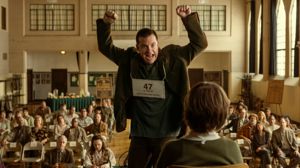I would imagine that many people might see your name in the credits for Bad Words and instinctively feel sorry for you. Temp score editor? How disappointing must it feel to put all that work into something you know from the very start is going to be replaced by the time anyone sees it? But you and I know better, don't we, Jon? The temp score is instrumental in shaping a film in the early stages of editing; it defines the film's tone and rhythm, and even after it has been replaced, its influence extends beyond those early assemblies--sometimes even to the _actual _composer's chagrin.
As a novice director, I'd imagine that Jason Bateman welcomed your veteran skill (what with your 34 music-related film credits and all). But maybe I'm overstating your contribution; Bateman may have known exactly what he wanted and instead came to you with a plan he knew you would (temporarily) execute. However it happened, it was all prelude to the final product--kind of like Jason Bateman's acting career leading up to his directorial debut. The character-type he has made his stock in trade - most notably the put-upon everyman doing his best to deal with an absurd situation - is one of the foundational elements of _Bad Words. _Except instead of using that template for his performance, Bateman, working from a script by Andrew Dodge, does a nice reverse on his own image.
As Guy Trilby, he is the absurd element of Bad Words: a forty year-old who, through a legal loophole, has infiltrated the children's spelling bee circuit. Instead of his usual schtick as the calm center keeping everything in order, Bateman is the chaotic, disruptive force. Why he's taken this route isn't made initially clear. What is clear is that he doesn't care about who he upsets, offends, or throws to the side in his quest to get to the big show: the Quills Spelling Bee, overseen by Phillip Baker Hall's intimidation Dr. Bowman. This might sound like a high-concept idea designed for shock value alone, but Bateman's considerate experience playing the offended party seems to have given him a keen eye on keeping things from getting too out of balance. Bad Words isn't too shy to make clear that, while Trilby may have a genuine beef to work out, he's still being a total dick about it.
As Trilby gets closer to the final prize, he tries to keep his relationships - specifically with Kathryn Hahn's journalist and another young contestant played by Rohand Chand - as shallow as possible. And Trilby's outward hostility towards, well, everyone, makes the world around him that much more sympathetic. Bateman cleverly uses his protagonist's misanthropy as way to get us to misread those around him; if he's the dick, the others must, in contrast must be decent. They're all not, of course, and finding out the true motivations of some of these characters is one of the pleasures of Bad Words. And while the film ultimately ends up in a pretty safe place, it gets there mostly honestly.
I say "mostly" only because of one tacked-on conceit: Trilby's voiceover, which runs throughout the film and has him speaking in the past-tense about the events of Bad Words. It gives the film an unnecessary sense of safety, evidence of a new director hedging his bets to keep us, as viewers, on his side. Hopefully it wasn't because he was worried that the tone wasn't properly set by the temporary work you did in those early post-production days. While it has fun with a broad concept, _Bad Words _would have been much stronger with a little more authority in its choices.
Sincerely,

Casey







